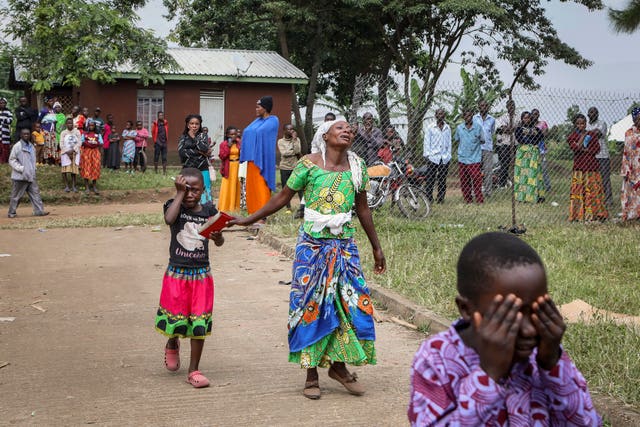Victims are buried after rebel attack on Ugandan school leaves 42 dead
In addition to 38 students, the victims included a school guard and three civilians.

Residents of a Ugandan border town have begun burying the victims of an attack on a school by suspected extremist rebels that left 42 people dead.
One of eight people wounded in Friday night’s attack, in which 38 students were killed, died overnight, said Selevest Mapoze, mayor of the town of Mpondwe-Lhubiriha.
“Most of the relatives have come to take their bodies” from the morgue, he said.

Some students were burned beyond recognition while others were shot or hacked to death after militants armed with guns and machetes attacked Lhubiriha Secondary School, which is located just over a mile from the DR Congo border.
Ugandan authorities believe at least six students were abducted and taken to DR Congo.

The atmosphere in Mpondwe-Lhubiriha was tense but calm on Sunday, as Ugandan security forces roamed the streets outside and near the school, which was protected by a police cordon.
Ugandan security forces have not given a detailed account of how the rebels, active in eastern DR Congo, were able to carry out the attack.
The group, known as the Allied Democratic Forces, or ADF, rarely claims responsibility for attacks. It has established ties with the so-called Islamic State (IS) group.

The ADF has been accused of launching many attacks targeting civilians in remote parts of eastern DR Congo in recent years, including one in March in which 19 people were killed.
The ADF has long opposed the rule of Ugandan president Mr Museveni, a US security ally who has held power in the East African country since 1986.
The group was established in the early 1990s by some Ugandan Muslims, who said they had been sidelined by Mr Museveni’s policies.

Students have been attacked because schools are considered soft targets, pupils are sometimes recruited into rebels ranks or used to carry food and supplies for insurgents, and such raids provide media coverage coveted by extremists.
The raid appears to have taken Ugandan authorities by surprise, with first responders arriving after the attackers had left.
Some villagers have moved away from the Mpondwe-Lhubiriha community temporarily, fearing more attacks, Mr Mapoze said.





